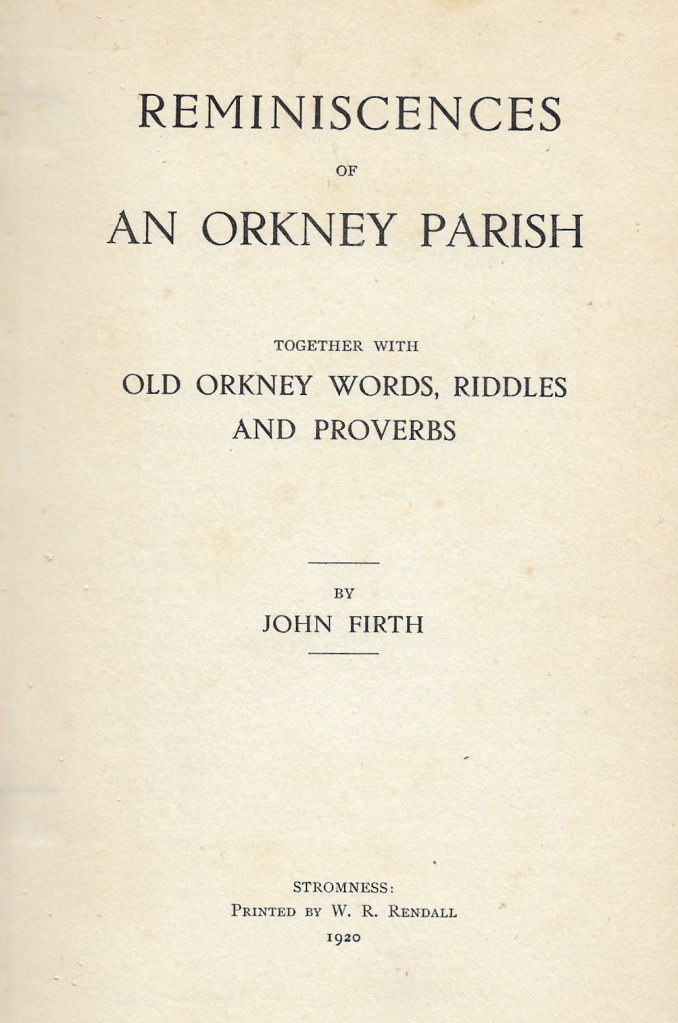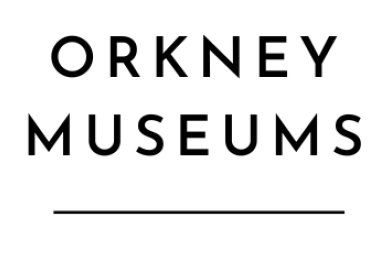Walter Traill Dennison and John Firth – their contribution to the collection of words in the Orkney Dialect

Author: Dr Tom Rendall
Walter Traill Dennison (1825 -1894) and John Firth (1838-1922) had a keen in interest in folklore and the heritage of Orkney and both writers also realised the value of the way people spoke using a dialect words interspersed with Standard Scottish English.
What I offer in this blog is a selection of their glossaries of words along with short articles setting out their interest in the local tongue and their rationale for collecting about 700 words each and including them in publications.
I have chosen some words rather than copy out the entire glossaries as I felt that this would be less akin to a dictionary and more a celebration of the dialect. It is important to point out that many of the words appear in both glossaries but Dennison had some that Firth did not include and, indeed Firth noted words that did not appear in Dennison’s work.

Walter Traill Dennison – Glossary of words in the Orkney dialect
Below is an abstract from Dennison’s preamble:
It would have been to the author a pleasant task to trace these old-world words, through all their varied and multiform windings, up to their original source in the Sanscrit language. To do this by dogmatic assertion, and hap-hazard guesses, might be an easy task; such guesses and assertions could be taken – as they often are – for scientific truth: but few as the words contained in the glossary are, to trace their etymology in a philosophical manner would require an amount of extensive and varied scholarship wholly beyond possible attainment by the author.
The two things attempted in this glossary are, to enable the reader to understand the meaning of the words, and to give some idea of the orthoepy of the Orkney dialect. The charming Orcadian patios is impossible to convey by representations to the eye -it can only reach the mind through the ear.
It was thought unnecessary to state the parts of speech to which the words belong, this being sufficiently obvious from the explanations.
In order to shew the pronunciation of the words, an orthography has been adopted, wherever this was possible, in accordance with the sound of letters in English. An English word, where it was thought necessary, has been given to shew the exact sound of the word explained.

Excerpts from the Glossary
A
Abble delicate,feeble
Alinerly solely,in particular
Anunder under
B
Beufsae clumsy,ungainly in shape
Boosam active,busy
Brullye great confusion and turmoil
C
Canteelmas idle/ill-natured gossip
Clashmacleevers idle tales
Cullye to cuddle or soothe by endearments
D
Dightan sheul a shovel for cleaning the byre
Dovened soft and sapless,withered up
Disjaskit having the appearance of neglect or disrepair
E
Eerison short prayer
Eggle to incite
Eum outrageously mad
F
Favillo a lumpish,lazy,clumsy person
Flawan telling fibs / spouting lies
Futh a large number/a great deal
G
Gafter a loud laugh
Gang wi go with/courted with
Glaickit light, giddy, rash
Glundy gluttonous
H
Habbergaws to blunder or make mistakes in reading
Harkin whispering
Henskly hurriedly or abruptly
Hosted coughed
Humelsho great confusion and turmoil
I
Ilty ill-nature / temperamental
Ime grime (on the outside of cooking utensils
Ims’d made/make haste (“imse theesel” – get going)
J
Jobbed pierced
Jund a heavy fall lor large piece of a sdubstance
K
Kemperman a champion
Klurty clumsy
Kniff nimble/smart
Kreest to press (verb) or pressure (noun)
L
Langersam weariness and lonely/longing for something
Leet to listen/appear not to know (“never leet thoo heard it)
Lippers ripples on the water
Lock quantity of anything/ a lot (“that is a lock of folk”)
M
Main patience,endurance
Menye company/party gathering for the night
Merky marrow
Mooran snowing heavily
Murgas turmoil/disturbance
N
Nebbid from “neb” – the beak of a fowl
Neud mirk extremely dark
Nouster landing place for boats
O
Old man’s milk mixture of milk,eggs,sugar and whisky
Oro things very small in size (plural)
Owsen oxen
P
Plunky a trick
Pone a petty oath
Preeve to taste or try
Prowley a sharp scolding (or corporal punishment)
Q
Quack “in a quack2 – in a bit of a state
Quarkie cough / clear throat with a choking sound
R
Ranty exceedingly cheerful
Reuan nodding through sleep or tiredness
Riggan the backbone
Rullye a great rush
S
Sarro any uncommon/unpalatable mixture of food
Skatfu voracious/greedy and gluttonous
Skeet a covered taunt or insinuation
Skreevis a violent wind
Spragled sprawled
Spunder to gallop
Sturt stir/disturbance
Suck dirty/ confused mess
T
Tame stretched out (“i-tame”)
Tapsquare ready to take offence
Teedburro moving vapours over land or water
Toy a woman’s hat
Tray long,tedious and wearisome
U
Undeemin enormous/ large or numerous
Unstowly blustery/unsettled weather
Usmal dismal/dark(often applied to the human face)
W
Whiman insinuating
Wharon sufficient support
Wilk a periwinkle
Y
Yark suspicious/afraid of
Yowling howling

John Firth – Glossary of words in the Orkney dialect
We will now turn to John Firth who lived in the parish of Firth on the Mainland of Orkney, He was a joiner and millwright and was well respected in the community. Firth also had a keen interest in recording many of the activities such as threshing and farming as well as the traditions surrounding births, marriage and death. He was also interested in the dialect and below is an excerpt from his chapter on old Orkney words followed by some words from the glossary in his book Reminiscences of An Orkney Parish.

‘For a period now extending to at least half a century, I have taken a profound and absorbing interest in the old words, phrases, rhymes and proverbs peculiar to our Orcadian vernacular and dialect, and although I am now considerably in years beyond the allotted span of threescore and ten, my enthusiasm and zeal in this, to me most fascinating pursuit is as keen and exacting as at any period of my lifetime.
‘It has invariably been my custom and practice, on hearing a word unfamiliar or new to me, particularly when coming from a person well advanced in years, to immediately, or as soon as favourable opportunity presented itself, jot it down. In this way I have accumulated a collection of about 700 words, which I have arranged into a kind of glossary, and for each word I have given its nearest English equivalent.
‘Some of the words are at the present day obsolete, but all were in common and frequent usage less than half a century ago.
In spite of the changes wrought in more recent generations, and amid the constant and ever-increasing additions and modifications, the old Orkney dialect, with its quaint and peculiar diction, is destined to no immediate or early extinction, and wherever Orcadians meet, in all parts of the world, its rich and beautiful accent and melodious tones awaken the most tender sentiments and emotions, and recall the most hallowed associations and cherished memories.’

Excerpts from the Glossary
A
Aar dislike / fear
Amis wel deserved punishment
Amsho mild form of oath
Atfares behavior
Atifore shame or regret at certain words or actions
B
Blide mate feast after a birth
Brigstones pavement at the door of a house (the brigs)
Broden impudent/pert
Buddo term of endearment
Burstin toasted bere, firmly ground
C
Caisie straw basket (carried on shoulders)
Camsho rude or ill-tempered
Claik to talk idly
Concordedly cooly,contentedly
Croilan failing in health
D
Daiskit stupid/slow
Demel to lift water with small can out of a larger one
Doon-fa sickness epilepsy
Dort to take offence
Druck o’ sweat a drench of perspiration
Dunder to make a loud noise
E
Eum mad or frenzied
Eun a disagreeable smell
Eetch a heavy kind of hoe
F
Fainfu glad or affectionate
Fang something valuable which is discovered
Feeflin working slowly or listlessly
Fimister excitement through fear
Fornent opposite
G
Gappas a blockhead / stupid person
Gee mood or notion
Glide went array (“squint”)
Gluff sudden fright
Grimleens twilight
H
Haedalt frivolous person
Heisk excited over a trifling matter
Hilderbogie a silly person
Hosted coughed
Howdie a midwife
I
Ill-hivered ill-tempered
Ill-vedyid intending to do evil
Iper stagnant muddy water
J
Jubish suspicious
Jaik a large tin mug
K
Kepsweevil to capsize
Kinlit unsteady wind
Kist a chest
Kleebo slight blow for correction
Klimsin parched with thirst
L
Laivagan gossiping
Leesom soft, pliable, agreeable
Lippen to expect
Loot to bend down
Lue lukewarm
M
Maenless impatient
Mirr tremor/vibration
Muggity fine rain/ very close atmosphere (also “muggity-feu”)
N
Nabal greedy, mean
Naevs fists
Naskan eating secretly
Niff clever or supple (fit)
O
Ootmoughted exhausted
Owse to boil out water
Oxter armpit
Oyce shallow arm of the sea which is dry at ebb tide
P
Pechan breathing fast
Pernickety over- particular / fastidious
Pleep low,whining tone
Piver to tremble or quiver
Q
Quark cough with a choking sound
R
Ramesh/Ramse rash or hurried
Ravsie rough or course / disheveled
Rift to belch through the mouth
Rive to tear
S
Sabbid soaked through
Scurt armful
Shilpid sour,acid
Skeet a covered taunt, insinuation
Skrunt mean (shabby) person
Sluan lazy fellow
Stroup mouth of a teapot or kettle
Swack supple, strong (“fit”)
T
Tiftan throbbing with pain
Tontie childish
Trimsin restless
Trowie sickly,indisposed
Tullyo a (wordy) quarrel
U
Ununyafu slightly indisposed
Unkin strange / unknown
V
Vansom ill to please
Vonna strong stentorian voice
Voar spring / seed time
W
Waersay craving for “dainty” food/something to whet the appetite
Waff smell /odour
Wally large
Weel-faured good looking
Whess breathe loudly and rapidly (panting)
Y
Yark space between thumb and forefinger
Yetlin a girdle
Yeuky itchy
